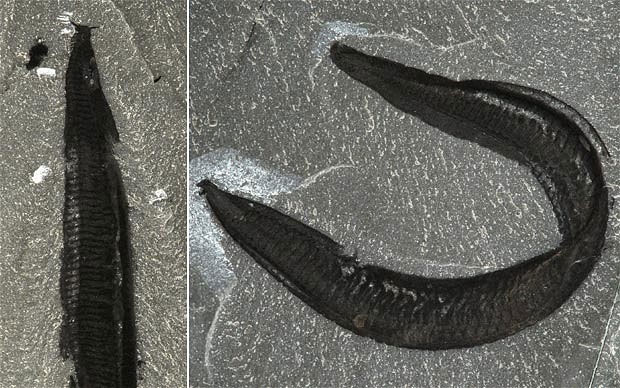Human ancestors are ... eel?
An eel-like prehistoric creature found in Canada has been identified as the oldest ancestor of humans that science has ever known.
This is the direct ancestor of all vertebrates on Earth, including humans.
According to the Telegraph , fossils dating to 505 million years have helped preserve these small animals. This is the most ancient form ever discovered of primitive spinal animals.

This is the direct ancestor of all animals
backbone on Earth, including humans.
And so, it is also a direct ancestor of all members of the Earth's vertebrate family, including fish, birds, reptiles, amphibians and mammals.
It also means that this 5cm long eel named Pikaia gracilens is the ancestor of humans.
The first to discover the fossil of Pikaia gracilens from 100 years ago was American paleontologist Charles Doolittle Walcott. Since then, scientists have hypothesized that this creature may be a vertebrate, because it possesses a simple form of nerve.
However, because pikaia lacks a complete vertebrate, there are still many doubts about the classification of this fossil. Now, an analysis of 114 prehistoric animal species conducted by Cambridge University, has discovered tiny bone tissue inside fossils. This discovery helped to erase all the last doubts.
Further analysis shows that this eel-shaped organism is divided into many different muscle masses, with a central spinal cord running along its length. They possessed a small head with two tentacles, no eyes, moved by bending the body like a snake.
- This horror creature turns out to be the oldest human ancestor
- New shocking disclosure of human ancestors
- Why do the ancient ancestors of human beings walk on two legs?
- Prove human ancestors of Asian origin
- Sexual revolution of human ancestors
- The reason the human ancestors gave up cannibalism
- Human ancestors are jellyfish?
- This is a human face if evolved from other animals that are not apes!
- Human ancestors can walk with their legs but most still live on trees
- Discover the earliest ancestors of humankind
- See 550 million years of human evolution in 1 minute
- Human ancestors 9,000 years ago also faced urban problems
 Discovered an ancient centipede fossil 99 million years old
Discovered an ancient centipede fossil 99 million years old Discovered bat-like dinosaurs in China
Discovered bat-like dinosaurs in China Discovered a 200-year-old bronze cannon of the coast
Discovered a 200-year-old bronze cannon of the coast Discover 305 million-year-old spider fossils
Discover 305 million-year-old spider fossils